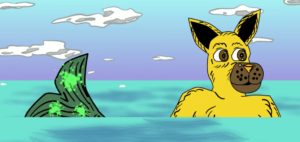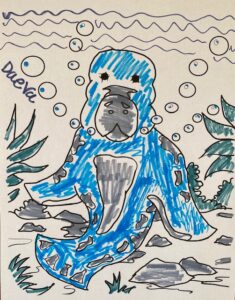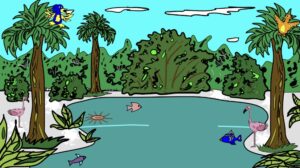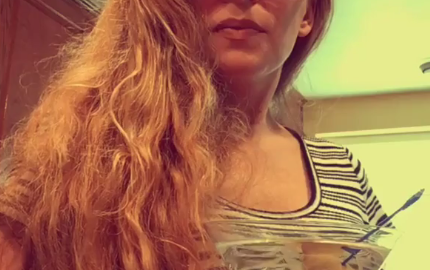I remember it vividly, I had written a story about ants and their world, not unlike the later movies Antz and A Bug’s Life, but written from an eight-year-old’s mind. The story won an award, and my love of writing was born. It was here I would flourish throughout my school years, reading and writing, earning many awards and commendations and eventually a spot at the University of California, Davis. As I got older, my creativity tended to get squashed under the mundane tasks of life and working in imagination-sucking offices. I was finally able to free myself from the smothering lifestyle I had become accustomed to, but never enjoyed. I was able to become a writer. It’s the only job I’ve ever loved.
I am always thrilled to meet fellow writers and authors, and I recently had the opportunity to interview children’s book author and illustrator, KJ Kaschula. KJ was born in Gauteng, South Africa, in the city of Boksburg. By high school, her family moved to a small town in the Vaal Triangle where she grew up and went to university. Driven by the need to create a story, she ended up studying the art of filmmaking and earned her degree in it. She longed to travel and ended up initially going to Chiang Mai, Thailand, to study teaching English, but returned home soon afterward to take care of her family. Not done with the travel bug, she then went to Paris, France, where she worked part-time as an au pair and spent the rest of her time creating stories. Her lifestyle soon became traveling from Gauteng to Paris and back. She learned to cook, fell in love, hiked and wrote and illustrated children’s books.
KJ published her first children’s book in 2021, titled I Caught One of Santa’s Reindeer, the first book in The-Super-Dooper-Secret-Collection, followed by I Captured the Easter Bunny’s Chicken and I Discovered a Monster Under My Bed. KJ discovered the world of hybrid publishing and joined the Brave Healer Productions publishing team, helping to birth the children’s book publishing imprint Brave Kids Books.
Brave Healer Productions is an award-winning collaborative publishing company that helps healers publish their stories of health and wellness, business, or kid’s books through its imprint Brave Kids Books. There are currently two volumes of the Brave Kids books, with a third volume coming out in June 2025. Brave Kids is a collection of short stories written by authors from around the world. Each story is uniquely crafted to inspire hope and change for a better world for humans, animals, and the Earth. Within these powerful stories, kids will find the tools, wisdom, and relatability they need to learn, grow, and become the best version of themselves. There are also Brave Kids activities that work alongside the short stories, like coloring and drawing activities that link up to the book, searches for hidden items that link up with the books, writing your own brave story, and writing a postcard to a Brave Kids author. KJ really hopes to get interest from schools and teachers around the world, and she would love to visit schools, either virtual or in-person, to get kids excited about reading and discovering adventures within their own minds.
Along those lines, I asked KJ if she has any tips for parents or teachers who are trying to get their kids interested in reading and writing. She responded that reading should always be for pleasure; whenever it is negatively forced, it will most likely be met with resistance at any age. So, to create positive reinforcements she has observed that sitting down with your kids before bedtime and bonding over a really good story creates a special moment that wants to be relived well into adulthood. It creates conversation and understanding around topics and makes you believe in the magic of being alive and experiencing such wonderful adventures and characters. She says to remember to make it fun. Changing your voice to suit different characters is great for you to let go and for your kids to sit back and enjoy the ride.
Another tip she has is to find out what your kid’s best friend is reading at home with their parents. We all want to read what our friends are reading so that we can talk about it later and compare our thought notes. She said she remembers when Harry Potter came out, one of the reasons she picked up the book was because “everyone” was reading it and she wanted to know what it was all about.
She explained that writing is another story. What works for her is when she gets really excited about a topic she chooses to write about. Once she chooses a topic, she says research is the key to unlocking the story because an informed mind can write and explore different avenues of ideas. Research does not just have to be “googling”, it can also be journaling your thoughts around a topic.
KJ has, in the past, gotten ideas and inspiration from the kids she took care of as an au pair. In particular, “Tonight is the Night”, Chapter One in Brave Kids, Volume 1, was inspired by one of the kids she looked over who did not want to sleep alone in their bedroom in the dark. At the time, she suggested that they close their eyes and imagine that their favorite animal (a cheetah) was made up of white, white light and that this animal made of the purest of lights would protect them and keep them safe, and that whenever they were scared, all they had to do was imagine that it was there, with them. She explained that other times the ideas that turn into the stories within her books can come from anywhere: a title can pop into her head, as is the case with I Caught One of Santa’s Reindeer, or they can be influenced by real happenings or occurrences—in this instance she would take a small piece of information and mold a story around it. A lot of the time, when she gets an idea, she does extensive research on a topic and allows the research to guide the story’s spark.
And what about the dreaded writer’s block? KJ believes that it always stems from procrastination and the best way out of it is research; with pen, paper and doodles to guide her way.
Poking around on KJ’s website inspired me to learn more about her books and all of the kids’ activities she offers. The following is what she shared with me:
What general age or grade range are your books?
Six to ten if you really want to get specific/generalize. The Brave Kids Books can go up to twelve years of age.
The age range is broad because I imagine parents sitting down with their kids just before bed and reading to them the fun adventures of Little Lizzie or a short ten minute story from Brave Kids. Or if their kids are older, nine plus, and they are feeling independent, then they can read it by themselves.
What inspires you most to write, what keeps you going?
I have always wanted to write ever since I was a little girl. I would constantly play with ideas—write them down, or even act them out. During difficult times, I have found that writing or being creative is what gives me air and allows me to breathe.
What keeps me going?
Well, this depends on where I am in my life’s journey. When I wrote, I Caught One of Santa’s Reindeer, there was a burning need within me to produce something concrete, to actually write and publish something that I could hold in my hands. With I Captured the Easter Bunny’s Chicken, I needed a push from my partner—my support system to get it done and just keep going. Brave Kids always comes down to a deadline-driven project, and I Discovered a Monster Under My Bed; this took a bit of everything, but mostly I needed to write and create this one for me and enjoy the process to its complete fullest.
You also illustrate your books. Did you have formal training to become an illustrator?
No, I actually haven’t had any formal training. Of course, I did some art in primary and high school, but that is about it. I have been drawing since I can remember, since someone put a coloring pencil in my hand.
What are the Secret Keepers?
The Secret Keepers are anyone who would like to follow me, and my journey as a children’s book author and illustrator. Once they sign up, they will get exclusive super-dooper-secret content, hear any and all news first, and get invited to be part of book deals, competitions, fun activities and more!
The Secret Keepers, stem from my first published children’s book series: The-Super-Dooper-Secret-Collection.
Tell me about the Easter Bunny’s chicken?
The Easter Bunny’s chicken or EBC is a character within I Captured the Easter Bunny’s Chicken, the second published book but the third book within the The-Super-Dooper-Secret-Collection.
The story follows Little Lizzie as she plans to capture the EBC so that she can have an endless supply of Easter eggs. She knows through the story told to her by Mr. M that there are many Easter egg deliveries around the world, so she figures the best Easter egg deliverer she could capture wouldn’t be the Easter Bunny, but it’s Chicken, who also delivers Easter eggs around Easter time. Through her Easter-time adventure, she discovers that sharing is caring, and that kindness matters the most.
Tell me about Little Lizzie? Is she based on someone you know or yourself?
Little Lizzie is a magical children’s character who almost sprung to life out of thin air. I like to tell people that it was she who whispered the title of her first book in my ear when I first began, which is partly true—the title I Caught One of Santa’s Reindeer, just popped into my head, and I immediately wrote it down so I wouldn’t forget it. She is not based on anyone; however, she does draw upon some elements within my own life. Her name and eye color, for instance, is courtesy of my mom, known as Liz. Little Lizzie also likes to draw, as do I, and she does not like others calling her by her full name—a small trait taken from myself.
What are some of the Monster activities coming soon and when can we expect to see them?
The Monster Activities are similar to their sister activities in I Caught One of Santa’s Reindeers and I Captured the Easter Bunny’s Chicken, and they will be arriving in October 2024 ready for some Halloween fun!
You split your time between South Africa and France. How is that? Tell me some things you love about France and also some things you love about South Africa.
In the past, I split my time between South Africa and France because I was an au pair. I would go to France and take care of my au pair family and then return home.
Today, I split my time between these two wonderful countries because I fell in love with my French man, and he, along with his country, stole my heart. I am also very fortunate that because I work in publishing, I can work remotely anywhere.
What I love about France: Great food, wine, culture, and language, and I get to walk everywhere. There are terraces to enjoy coffee with friends and parks to hike in.
What I love about South Africa: It is my first home and where my family and doggo’s are. It is sunshine and warmth almost all year around, it is my heritage and is part of who I am.
How do you find the time to write and do all of your creative activities?
Honestly, I have to make time for it. It’s a lot of late nights, early mornings, and weekends, with a dash of perseverance and determination. Remembering the big why is key, and having a support system nearby or on the phone helps give me a little push.
Is there something you want to talk about, it can be anything? Feel free to highlight anything you would like.
Yes, I would like to talk about my new book, I Discovered a Monster Under My Bed, which was just released.
This book I am extremely proud of and has challenged me in many ways. It is the third published book in The-Super-Dooper-Secret-Collection (although it is book 2 in the series).
I Discovered a Monster Under My Bed, is a great book for this Halloween. Gift it to a kiddo and get them excited about discovery, not only who the monster under the bed is but also the world which lies under, it’s just waiting to be explored. It deals with themes such as bravery and courage, friendship, and kindness, as well as rediscovering the joy of reading.
Also, if anyone would like to follow me they can by signing up to the Secret Keepers at: https://www.kjkaschula.com/home/send-a-message/join-the-secret-keepers/ and follow me on Instagram at: https://www.instagram.com/kj.kaschula
If you would like to learn more about KJ Kaschula and her books, please visit www.kjkaschula.com.
This article was originally published on OpsLens.com.



